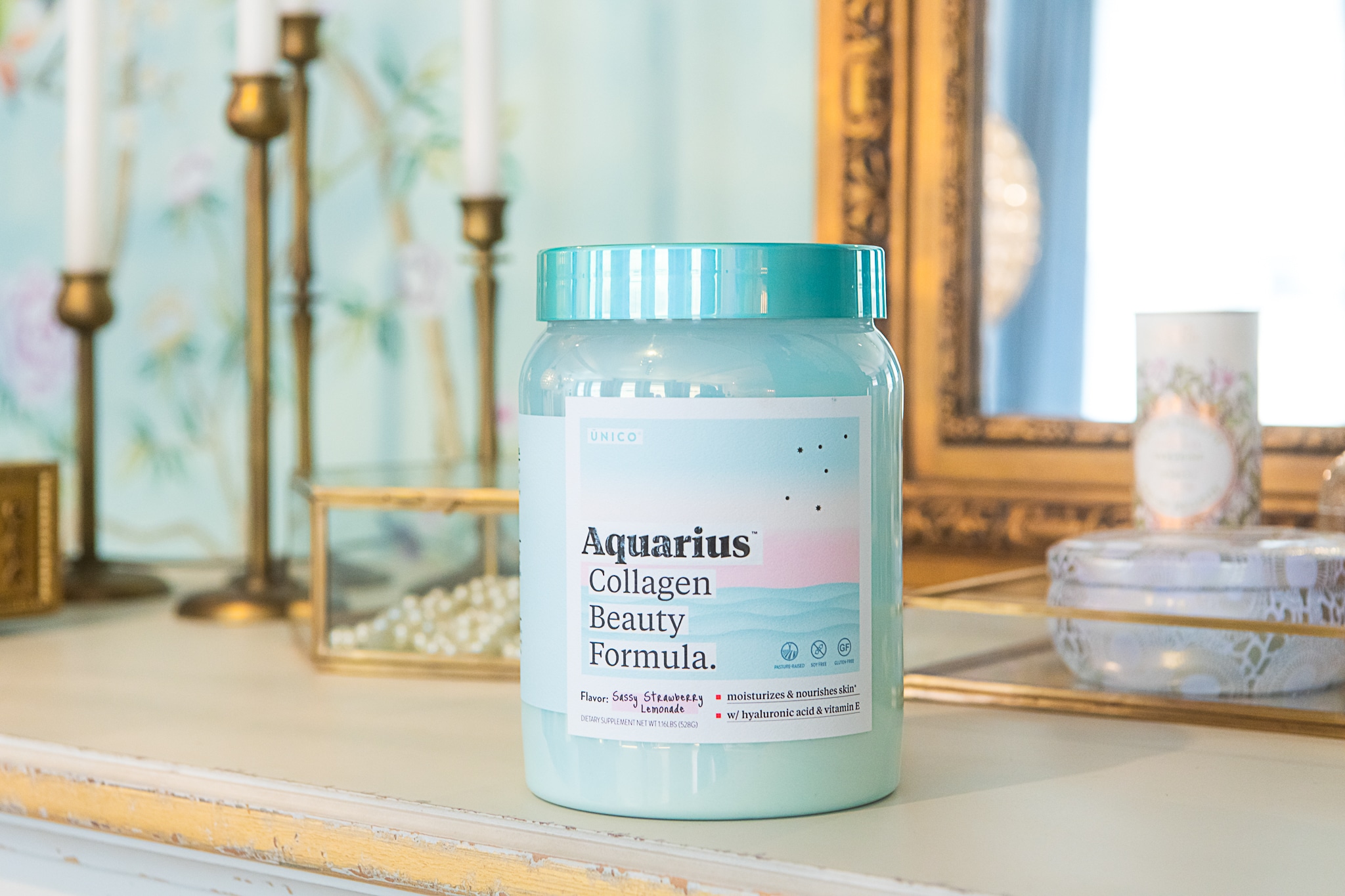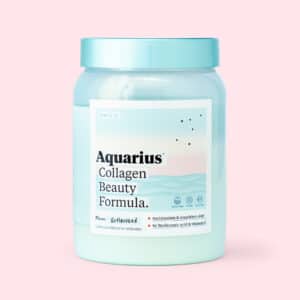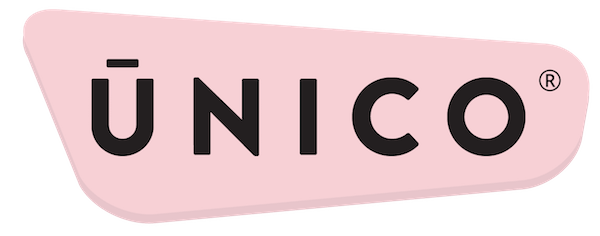Collagen is everywhere. You’ve probably seen TONS of ads and commercials for collagen lately – touting its benefits for skin and nails.
Meanwhile, jars of collagen protein line the shelves at your local grocery and wellness stores.
There’s no doubt about it – collagen is here to stay.
But how much science is really behind it? And how much collagen you really need per day to see results?

What Is Collagen?
With all the hype surrounding collagen, it’s amazing how many people don’t even know what collagen is!
Collagen is one of the most prevalent forms of protein in your body.
In fact, It actually makes up as much as one-third of all the protein in your body!
It is found in bone tissue, muscle tissue, and even in your blood.
It’s responsible for giving your joints and skin its structure, durability, and elasticity.
Collagen also helps to keep your skin hydrated.
Where Does Collagen Come From?
You’ve probably heard of bovine, porcine, or even collagen from marine sources by now. (More on the common collagen sources later!)
But what you might not know is that is that we produce our own collagen naturally when we consume enough protein.
When you eat protein, it is broken down into independent amino acids, (a.k.a the ‘building blocks’ of protein) that help build new body tissue.
Your body combines those amino acids in various ways depending on its needs.
One of those combinations, as you might have guessed, is the one that creates new collagen.
Unfortunately, as we age, our body’s ability to naturally produce our own collagen decreases.
That’s why people have started reaching for collagen supplements- to give their bodies a boost of this natural protein.
Why Take a Collagen Supplement?
Even though we make our own collagen, there are plenty of potential benefits to supplementing with collagen.
While we know for certain that collagen is an essential protein for our bodies, there is still a lot of debate about the benefits of supplementing with collagen.
Luckily for us, the scientific community has been curious as well.
In fact, there is more and more evidence coming out each day as a result of numerous scientific studies on collagen.
The vast majority of them are showing just how beneficial, and versatile collagen really is.
Here are just a few of the most commonly noted (and proven) benefits of supplementing with collagen protein.
1. Bone Strength and Joint Health
We all know that as we age we become more susceptible to bone weakness and diseases like osteoporosis.
But studies seem to indicate that daily collagen supplementation helps increase bone density and support the body in creating new bone tissue – all of which helps strengthen your bones and maintain bone density and strength as we age.
Collagen also provides benefits to joint health, promoting strength and elasticity to help keep your joints limber and healthy for any activities.
This is also a benefit that may be more pronounced in older adults.
2. Healthier Hair and Nails
Collagen is most commonly associated with improving skin health, however, it’s also an effective hair/nail booster.
For many years, keratin was the go-to supplement for hair/nail health.
But recently, collagen has jockeyed into the top spot in the world of hair and nail supplements.
That’s because the growing body of scientific research behind collagen is impossible to ignore.
One study showed that women who were struggling with thinning hair saw increased hair quantity, thickness, and scalp coverage after supplementing with collagen protein on a daily basis.
Another study on women’s nails showed that their nails were less likely to break, and grew faster, after taking daily collagen supplements for four weeks.
3. Increased Skin Hydration and Fewer Wrinkles
Collagen’s most sought-after benefit may very well be that of anti-aging.
The anti-aging market has been popular for decades in cosmetics and broader beauty category.
Customers gravitate towards creams, cleansers, masks, and antioxidant-rich beauty supplements to support a youthful complexion.
Collagen has become a true anti-aging tool as well, as studies prove its value in this popular space.
A 2015 study conducted in London proved that collagen helps reduce wrinkles as you age.
Collagen also may help keep your skin at a healthy level of hydration.
Collagen is very prevalent in your skin but, as mentioned before, it decreases as you age, so these benefits may be particularly pronounced in older adults.
What Is in Collagen Supplements?
Like most proteins, there are multiple forms and types of collagen.
The most common types of collagen protein found in collagen supplements are hydrolyzed collagen, undenatured collagen, and gelatin.
- Hydrolyzed Collagen: (also known as ‘Peptides’) Hydrolyzed collagen is derived from cows (‘bovine’ collagen), pigs (‘porcine’ collagen), fish (‘marine’ collagen), and even eggshells. Hydrolyzed collagen is then broken down into easy to digest peptides through additional processing.
- Undenatured Collagen: Undenatured collagen is derived from the cartilage in chickens.
- Gelatin: Gelatin is cooked collagen, also from animal sources.
As you can see, these are all animal-based sources of collagen.
Unfortunately, there are no vegan options when it comes to collagen, nor is there an alternative that is plant-based.
You can find collagen sources that are dairy-free, gluten-free, and sugar-free, but none which are free of animal products.
How Much Collagen Should I Be Taking Per Day?
Since collagen is relatively new to the supplement world, there isn’t a clear consensus yet on how much you should take every day.
There are, however, a few basic tips to follow to help you get the most out of your collagen.
Hydrolyzed Collagen Dosing
Hydrolyzed collagen is the most common type of collagen supplement you will find on the market.
During production, hydrolyzed collagen is broken down into tiny bits called ‘peptides’, which are easy for the body to digest.
You can find hydrolyzed collagen peptides in powder form and in capsule form.
How Much Collagen Should I Take as a Beginner? A good starting point is taking 10 grams of collagen peptides per day.
If you are new to taking collagen, a good idea is to start by taking 8-10 grams of a grass-fed collagen peptide supplement for one week to evaluate results.
10 grams per day is a good baseline dosage, which should offer the most collagen benefits of:
- Improving bone density and strength
- Improving overall skin health, hydration
- Reducing wrinkles
- Easing joint pain
Once you have used collagen at 10g for one week, you can adjust up or down based on your personal results and goals.
Those looking to use collagen as one of their primary protein sources in their diet should consider taking 15-20 grams fo collagen.
Collagen Powder vs Capsules

Collagen is offered in both capsule and powder formats. There are pros and cons to both delivery methods.
While capsules may be more convenient than powdered options, there is a drawback to capsules – they are small!
And even though small is convenient, small also means less collagen.
Most standard capsules can hold about 750mg of dry powder each – or just less than 1 full gram.
This means you would have to swallow over ten pills in one sitting to get a recommended 10g dose of collagen!
For some, that is a tough pill to swallow. (or ten!)
Undenatured and Gelatin Collagen
There is much less research done into these two types of supplements.
Undenatured collagen is fairly close in supplement dosage to hydrolyzed, but be sure to check the packaging and start with the recommended dose from the manufacturer before adjusting.
Gelatin collagen is often used in cooking and baking and is therefore not used as a supplement. As such, there is no dosing recommendation available for gelatin collagen.
Is There a Risk to Taking Too Much Collagen?
Collagen protein supplements are considered generally safe and effective for use.
There are some side effects to taking too much collagen, like gastrointestinal discomfort.
Make sure to talk to a doctor if you experience side effects from taking collagen supplements and always follow your doctor’s advice when it comes to your health and well-being.
Summary:
Collagen is a safe, and effective protein supplement that promotes skin, nail, and hair health.
This important protein also provides joint support and helps to keep bones strong.
Here at UNICO, we have our own collagen protein powder that we call Aquarius.
Aquarius is a collagen peptide supplement that will help give you a needed beauty & wellness boost.
Aquarius Collagen Beauty Formula contains 20 grams of collagen protein per scoop along with hyaluronic acid and vitamin E to support your skin from multiple angles.
Our unflavored Aquarius Collagen Beauty Formula has zero “protein” taste, blends easily, and contains no added colors, flavors, or sweeteners.
Our collagen has only the ingredients you need with none of the extras to weigh you down.
It’s also dairy-free, soy-free, and gluten-free – making it perfect for anyone seeking to boost their skin and nail health.
Give Aquarius Collagen Beauty Blend from UNICO a try, and feel the rejuvenating power of collagen yourself!
Sources:
Enigmatic insight into collagen | NCBI
Hydrolyzed Collagen-Sources and Applications | NCBI
Health Benefits of Collagen: Pros and Cons, Nutrition, and More | WebMD
Recommended Reading:
- The Best Liquids to Mix Your Protein Powder Into - January 31, 2023
- What is a Caloric Surplus? Plus, Why Your Diet Isn’t Working.. - October 17, 2022
- How Much Protein Do I Need Per Day? A Dietitian’s POV - July 26, 2022

